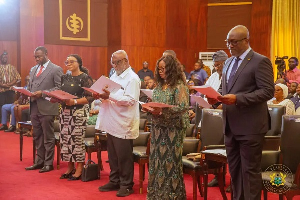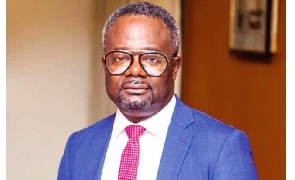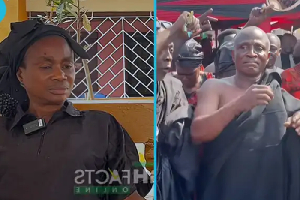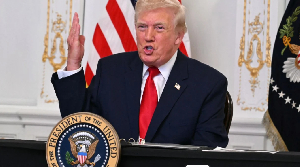In January, two prominent members of the (P)NDC government, Flt. Lt. Jerry Rawlings and Captain Kojo Tsikata appeared at the National Reconciliation Commission (NRC) to answer questions on their involvement in the killing of 3 High Court Judges, a retired Army Major, Amartey Kwei and an Army Corporal. The hearing of Mr. Rawlings was particularly marred by violence, which indicated that NDC has still not cleansed itself of violence and hostility.
The behaviour of NDC supporters and functionaries at the NRC reminded Ghanaians of the 1980s and 1990s, where fear and hostility became the virtues of government. Democracy and violence cannot co-exist and it is important that the top brass of NDC understands it and changes the image of the Party before it falls.
At the hearing of Mr. Jerry Rawlings, the NDC members carried flags, banners and placards such as ?We Will Die with You, JJ? and ?Touch JJ and Ghana Will Burn!? Earlier, I heard Mr. Victor Smith utter inflammatory messages on the Adom FM, which in the dark ages of PNDC could have landed an opposition member in jail. He warned that Ghana would burn if someone should touch the hair of Mr. John Rawlings. This statement drew criticisms from the general public, which compelled Mr. Victor Smith to revise his utterances. When Mr. Rawlings appeared at the NRC, some NDC supporters held photos of the late Ya-Na (the King of Yendi) because they wanted to create undue political tension.
The attack on the Editor of the Statesman by supporters loyal to NDC and Mr. Rawlings, as he tried to cover the proceedings of the NRC, illustrates that NDC is making itself redundant in the democratic processes taking place in the country. It is shameful that NDC sees aggression and intimidation as legitimate tools for promoting political aspirations. The other time when Dr. Kwesi Botchwey tried to contest the Party?s candidacy for the presidential election, he was humiliated and booed. His supporters, including the former MP for Amenfi West, Mr. Kofi Asante was beaten and heckled, which led to his resignation from NDC. Even the Party?s Chairman, Dr. Obed Asamoah was not spared because he supported the Prodigal Son, Dr. Botchwey instead of the Chosen One by Mr. Rawlings.
Basically, the violence within the camp of NDC manifests itself in two main form ? verbal and physical. The verbal violence - usually straightforward insults, insensitive personal comments and ethnic and tribal insinuations - is promoted by leading Party functionaries in the likes of Mr. Victor Smith, Dr. Josiah Aryeh and Mr. Rawlings. Unfortunately, they are being joined by Haruna Iddrissu (NDC National Youth Organiser), who until recently, I considered to be part of a new breed of NDC leaders. Mr. Haruna Iddrissu is reported to have said that Mr. Kwabena Agyepong got his post as a government spokesman because his father was killed during the PNDC era. Mr. Haruna Iddrissu did not do well to mock Mr. Agyepong with the death of his father. Dr. Josiah Aryeh is infamously known for the tribal tensions his utterances cause. Other NDC members are keen to link NPP to disturbances and conflicts in certain areas of the country - an assertion, which falls flat on its face given the NPP?s desire for peace and freedom.
Physical violence associated with NDC is masterminded by its leading members, but you hardly see them take active role in demonstrations, victimisations, beatings or destroying property. Due to poverty, the architects of violence are able to recruit unemployed youth and men, usually from very poor and deprived neighbourhoods, who are willing to cause destruction and confusion for as little as 5,000 cedis per day and a free lunch of fried rice or a bottle of akpeteshie. The government should think of banning the drinking of akpeteshie as we get closer to the elections because it is being misused by some NDC activists to cause havoc. Ghana is doing well, but the violence, particularly the utterances of Mr. Rawlings is creating insecurity, which does not augur well for the development of the nation.
Ghanaians are peace-loving people and they shun intolerance and aggression. Whether you talk to Christians, Moslems or Traditionalists, they are all unanimous in their condemnation of political violence, which makes it clear that until NDC embraces democratic norms and institutions, and recognises freedom, it will be difficult for it to win the hearts and minds of the populace. Citing the words of the Koran and the example of the Holy Prophet Mohammed, violence is unjust and offensive to God and thus a disloyalty to religion. The Christian Holy Book, the Bible similarly sees justice as a universal value and teaches that a person who appreciates peace and freedom glorifies God. The former Chief Priest of Afrikania Mission, Osofo Kofi Ameve (of blessed memory) saw a just treatment as an inalienable right of all persons and an unjust treatment as a betrayal of our Ghanaian values.
The interest in the work of the NRC across the breadth and length of the country demonstrates a deep sense of appreciation of peace and freedom, which is increasingly becoming the hallmarks of NPP. The cornerstone of our democracy lies in our ability to oppose conflict mongers, because rights and freedoms are the basis of stability.
NDC is alarmingly becoming an irrelevant partner of the development process in Ghana because it seems to adore violence and look down peace and freedom. During the just ended registration exercise, Mr. Rawlings and his guards were said to have assaulted someone at Ashaiman. He has refused to respond to the investigation of the police. Sometimes, I think that Mr. Rawlings does not want Mills to succeed given his utterances and behaviour.
Despite the view held by the majority of the people in Ghana that the NPP will rule, at least, for the next 20 years, I still implore the peace-loving NDC supporters to rise up and save their party from abyss. Ghana seriously deserves a better opposition than the one we are getting from the NDC!















